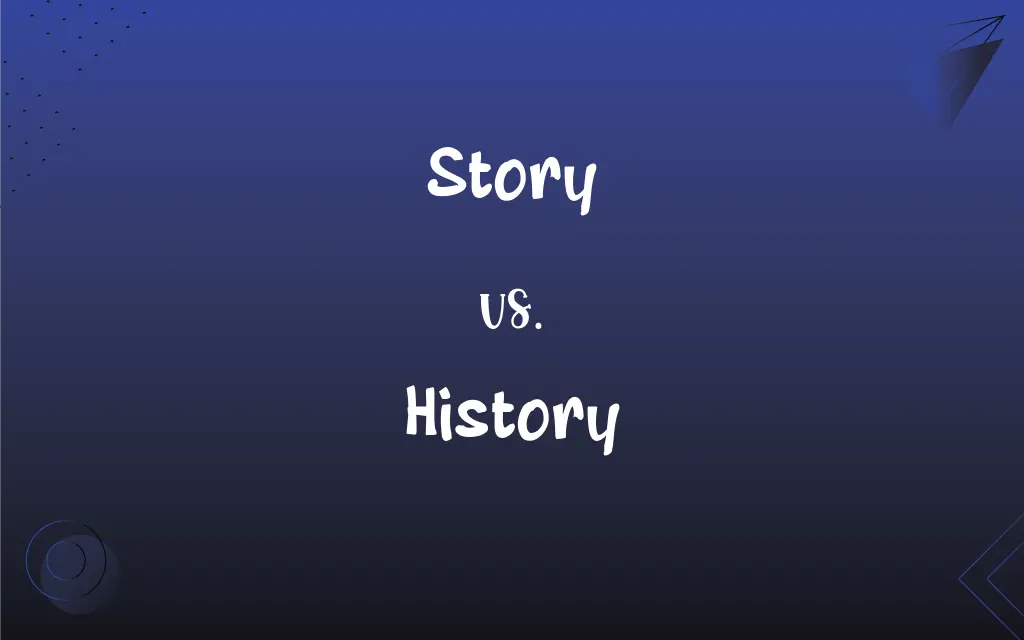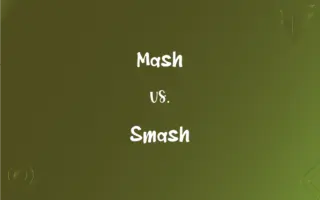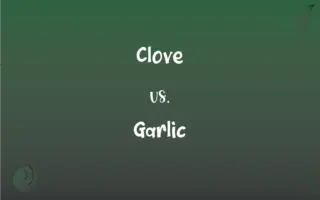Story vs. History: What's the Difference?
Edited by Janet White || By Harlon Moss || Updated on November 6, 2023
A story is a narrative, either true or fictitious, in prose or verse; history is the study of past events, particularly in human affairs.

Key Differences
A story is a narrative account of events, which can be either true or imagined, designed to entertain, educate, or convey a message. History refers to the recorded events of the past, often grounded in evidence and scholarship, pertaining to human societies.
While a story can be a work of fiction, fantasy, or a factual recount, history is concerned with factual accuracy and the objective analysis of cause and effect in human actions over time.
Stories can be found in novels, films, and oral traditions, often with a focus on plot, characters, and a narrative arc. History, however, is chronicled in academic texts, documentaries, and archives, with a focus on chronology, context, and interpretation of events.
The creation of a story is an act of artistry that may involve imagination and creativity, whereas documenting history is an act of investigation, requiring research and often a critical examination of sources.
Comparison Chart
Nature
Can be fictional or non-fictional
Non-fictional and based on facts
ADVERTISEMENT
Purpose
To entertain, teach, or engage
To record, analyze, and interpret past events
Form
Found in literature, film, oral tradition
Found in academic texts, archives
Focus
On narrative, characters, plot
On chronology, context, facts
Flexibility
Author has creative freedom
Historian aims for objectivity and accuracy
Story and History Definitions
Story
The plot or succession of incidents in a novel, poem, or play.
The movie's story was both complex and compelling.
ADVERTISEMENT
History
A continuous, systematic narrative of past events.
The professor gave a lecture on the history of the Civil Rights Movement.
Story
A tale that may be fact or fiction.
She captivated the children with a story about pirates.
History
A record or narrative description of past events.
The book provides a detailed history of the French Revolution.
Story
A narrative with a specific start, development, and conclusion.
The novel's story unfolded in a series of unexpected twists.
History
The aggregate of past events in the context of human society.
The museum exhibit depicted the history of aviation.
Story
A report of an event or series of events, either true or fictitious.
The journalist wrote a story covering the recent protests.
History
An academic discipline that records and analyzes past events.
He majored in history because he loves learning from the past.
Story
An account of past or fictional events that aim to entertain.
He always tells a funny story at family gatherings.
History
The study of past events, particularly human affairs.
She has a deep passion for studying Roman history.
Story
An account or report regarding the facts of an event or group of events
The witness changed her story under questioning.
History
A chronological record of events, as of the life or development of a people or institution, often including an explanation of or commentary on those events
A history of the Vikings.
Story
An anecdote
Came back from the trip with some good stories.
History
A formal written account of related natural phenomena
A history of volcanoes.
FAQs
Are all stories based on history?
Not all stories are based on history; many are works of fiction.
What's the difference between a historian and a storyteller?
A historian researches and interprets past events, while a storyteller creates and narrates tales.
Can a story be part of historical records?
Yes, if the story is a factual account, it can be part of historical records.
Can a story affect history?
Yes, stories can influence perceptions and decisions, thereby affecting history.
Can history include stories?
Yes, history can include stories as long as they are based on factual evidence.
Is history always true?
History is an interpretation of the past based on available evidence and is subject to revision.
How is history preserved?
History is preserved through scholarly research, archives, artifacts, and written records.
Do stories always have to have a moral?
No, not all stories have morals; some are simply for entertainment.
What is a story?
A story is a narrative or tale, either true or imagined, designed to entertain, educate, or convey a message.
Why is history important?
History is important to understand the past, learn from it, and shape future decisions.
What is history?
History is the study and recording of past events, especially those concerning human societies.
How are stories preserved?
Stories are preserved through writing, film, oral tradition, and digital media.
Are stories subject to interpretation?
Yes, stories can be interpreted in multiple ways depending on the audience.
Do stories change over time?
Stories can evolve as they are retold or adapted to different media.
Is historical fiction a story or history?
Historical fiction is a story that takes inspiration from historical facts but includes fictional elements.
Why are stories important?
Stories are important for culture, entertainment, education, and sharing experiences.
Can anyone write a story?
Yes, anyone can write a story with creativity and narrative structure.
Does history change over time?
The interpretation of history can change as new evidence comes to light and perspectives shift.
Is history subject to interpretation?
Yes, history is often interpreted through various perspectives and methodologies.
Can anyone record history?
While anyone can record events, historical recording typically requires research and adherence to factual evidence.
About Author
Written by
Harlon MossHarlon is a seasoned quality moderator and accomplished content writer for Difference Wiki. An alumnus of the prestigious University of California, he earned his degree in Computer Science. Leveraging his academic background, Harlon brings a meticulous and informed perspective to his work, ensuring content accuracy and excellence.
Edited by
Janet WhiteJanet White has been an esteemed writer and blogger for Difference Wiki. Holding a Master's degree in Science and Medical Journalism from the prestigious Boston University, she has consistently demonstrated her expertise and passion for her field. When she's not immersed in her work, Janet relishes her time exercising, delving into a good book, and cherishing moments with friends and family.
































































